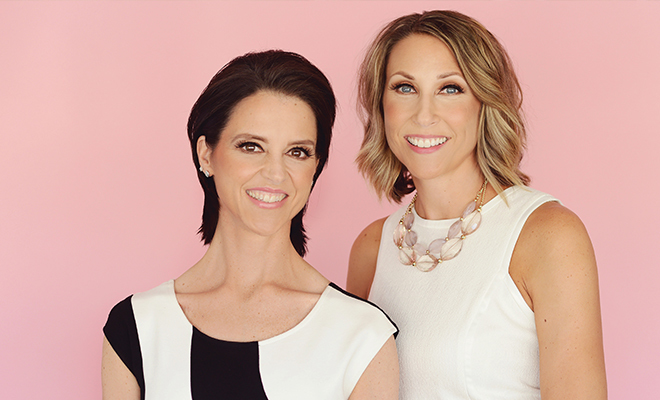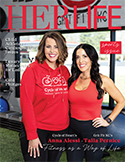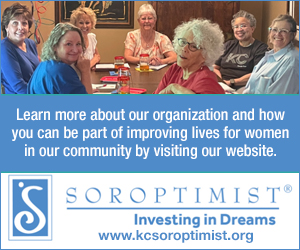 heather morrow
heather morrow
Breast Cancer Survivors Tracy Patch & Tori Burnett
Learning that a member of your family has been diagnosed with cancer gives you concern, not only for your relative but also for the impact this news could have on your health. However, a cancer diagnosis in your family doesn’t necessarily mean that you’re destined to get this disease in your lifetime.
Most cancers are diagnosed in older individuals and in people with little to no family history of cancer. However, in a minority of cases, individuals are born with a genetic change, or mutation, in a gene that causes them to have a higher chance of developing cancer. Many genes in our body help prevent cancer by correcting DNA damage. If these genes are not functioning properly due to an inherited mutation, then there is an increased risk for cancer in certain organs.
Many women are turning to genetic testing to determine if they carry these genes. In fact, five to ten percent of breast cancers are hereditary, so understanding your potential to get this disease can give you an important tool to ensure a healthy life. Knowing your risk can empower women to remain diligent and on the lookout for changes. Early detection of breast cancer is a key to ensuring success and saving lives.
In the Kansas City metro area, Sarah Cannon HCA Midwest Health offers the leading genetic testing and counseling program, which means patients have greater access to cutting-edge, comprehensive and collaborative care. Patients have called upon the expertise of Sarah Cannon HCA Midwest Health to work with their medical professionals as they offer guidance, knowledge and experience to lead them through a very difficult period.
Tracey Patch
survivor
It was March 2014 when former pro figure competitor and bodybuilder Tracey Patch discovered her breast cancer. Her attentiveness to her extensive exercise routine and intense focus on eating healthy did not prepare her for what was ahead.
“It was a Saturday morning and I was doing my daily stretching and found a lump at the bottom of my right breast,” Tracey said. “It just happened to be two days before my annual mammogram.” When Tracey went to her appointment, the radiologist ordered an ultrasound. A month later, she had a biopsy and the results showed invasive ductal carcinoma.
“When I got the call that it was cancer, I was in shock,” said the Lenexa resident. “I kept thinking about my healthy diet and my exercise regimen. But now I know cancer doesn’t discriminate, and it will get you if it wants to.” After consulting with Dr. Anne Kobberman, board certified and fellowship trained breast surgeon with Sarah Cannon HCA Midwest Health, Tracey decided on a treatment plan that included a double mastectomy, which was performed two months after she found the lump. Months of aggressive chemotherapy and radiation have followed.
Seeking Knowledge of Family Risks
Although Tracey’s mother had breast cancer at age 35, she wasn’t familiar with her father’s side of the family and its history, and she decided to pursue genetic testing. Both Tracey and her sister underwent the process. “If anyone has the chance for genetic testing, do it,” Tracey stated. “Be proactive. My mom had breast cancer and my cousin had ovarian cancer, but I didn’t know about genetic testing. If you have the chance of getting cancer because of your family history, seek out the genetic testing.”
Tracey’s genetic testing results uncovered more tough news. “I found out I also had a chance of ovarian cancer,” she says. “My sister’s test came back negative.” After consulting with her doctors, Tracey decided to have a hysterectomy to remove the threat of ovarian cancer.
Know Thy Body
“Self-awareness of your body is so important,” says Tracey, who finished radiation in November 2014 and had reconstructive surgery in June 2015. “Although I’m an athlete and led a healthy lifestyle, I didn’t do monthly self-exams. Now I know it’s very important. I tell women that they should listen to their bodies, and if something doesn’t feel right, get it checked out. Don’t wait because cancer can move very fast. Sure, you might be scared, but be proactive and get it checked out.”
Tracey notes her cancer assessment that was possible through genetic testing played a big role in how she thought about her personal cancer threat. She says the information was powerful, and even though she was aware of her mom’s history, she was in denial about the potential she had of developing breast cancer. The experience has certainly been impactful for her but also has given her a new outlook on life. “Cherish every day and every moment that you have with friends and family. I was a healthy person and didn’t think I’d get cancer,” she remarked. “Having cancer made me realize that you have to treasure every moment you have and live each day to the fullest.”
Back to Living a Full Life
As for the future, Tracey hopes to get back into body building. “I’ve talked to my trainer, and I’m ready to return to lifting. It will take a couple of years to get back to where I was,” she said. “When I was in treatment, it was hard for me not to go to a gym and work out; in fact, it was devastating. After healing from radiation, I started training for a half marathon, which I did in May 2015, and I’m training for another one this month. With that success, there’s a possibility I could step back out onto the stage. You can do anything if you want to, so don’t hold back and shoot for the stars.”
Tor Burnett
Survivor
In April 2013, Tori Burnett had been feeling a bit of pain in her right breast but chalked it up to a sore muscle from a new workout routine. But those dismissive thoughts turned to ones of concern when she later found a lump during a breast self-exam. The 42-year old Olathe mother of two was troubled and reached out to the medical community for answers.
Tori, who relocated to Kansas City from Minnesota just three months prior to finding the lump, visited her new OB-GYN, who suggested waiting for a few weeks to see if the lump would go away. “He thought perhaps it was part of my cycle,” remembered Tori. “He also didn’t want to put me through unnecessary testing, if it was nothing.”
The Importance of Taking Action
But that advice didn’t set well with Tori, and she became obsessed with the possibility that she might have cancer, just like her mother and grandmother. She checked the lump up to ten times a day. “I just couldn’t take not knowing,” she said. “So I went back to the doctor and had a mammogram, which didn’t reveal anything, but the following ultrasound did show a tumor. My doctor then referred me to Dr. Anne Kobbermann at Sarah Cannon HCA Midwest Health, who ordered a biopsy. The results came back as invasive ductal carcinoma triple negative.”
Tori met with Dr. Stephanie Graff, breast oncologist and board-certified medical oncologist/hematologist with Sarah Cannon HCA Midwest Health to plan her strategy to beat cancer. Five weeks after the lump was found, she underwent surgery to remove it. The lump had nearly doubled in size from the original ultrasound. Because it was so aggressive, her treatment was equally aggressive, with both chemotherapy and radiation. She also underwent a genetic test to help determine a strategy in case her risk level was elevated for other cancers.
Options Based on Genetic Testing
“My cancer was different from my mother and grandmother because theirs was post-menopausal hormone-based breast cancer,” noted Tori. “My tumor was still small enough that a lumpectomy was a viable option for me. If the genetic testing had come back differently, I would have had the mastectomy and possibly a hysterectomy to eliminate my risk for ovarian cancer.” It’s been more than a year since her diagnosis and her outlook for a solid recovery is good. She now sees Dr. Graff every six months and hopes for the all-clear in three years.
Listen to your Instincts
Tori urges women to be vigilant about breast self-exams, pointing to her own discovery as the first step in beating her very aggressive cancer. “Everyone knows their body best, better than anyone else. When the doctor said to wait after finding my lump, I couldn’t do it because something was not right,” remarked Tori. “As scared as I was, I find that cancer has positively impacted my outlook on life. It was almost a gift, because it altered my attitude and changed me for the better. I have more patience with my children, and I deeply appreciate the time I spend with family and friends. You don’t know when your time is up, so don’t take anything for granted.”
Genetic Testing: Improving Survival Rates
The statistics are sobering. About one in eight women in the U.S. will develop invasive breast cancer over the course of her lifetime. Unfortunately, more than 40,000 of them will die from this disease. But thanks to treatment advances, early detection through screenings and increased awareness those numbers are coming down. For Tori and Tracey, the use of genetic testing was another course of action to add to their strategy to get well, enhancing their battle against breast cancer.









